Interview with STAR program participants
Mr. Ha Van Quang and Mr. Hoang The Huynh, VAST/STI, Vietnam
September 30, 2010
STAR program office, JAXA Sagamihara Campus
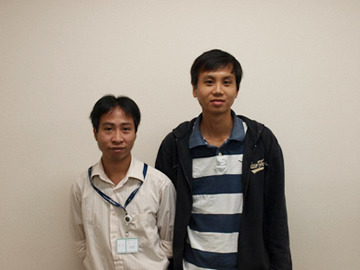
Mr. QuangMr. Huynh
The APRSAF Secretariat conducted an interview with STAR program participants, Mr. Ha Van Quang and Mr. Hoang The Huynh, from the Space Technology Institute of Vietnam Academy of Science and Technology (VAST/STI) on September 30, 2010, at the STAR program office on the JAXA Sagamihara Campus. The participants have been working with the same department at VAST/STI and came to Japan in May 2010. The scheduled duration of their visit was 6 months.
Could you tell us your specialty/background?
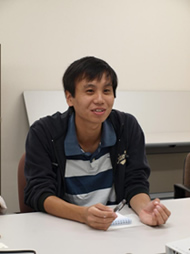
Hoang The Huynh:
My background is mechatronics. Since I joined VAST/STI, I've been working in the structural group and on a number of projects of software development in the department. Currently, my work in VAST/STI is mainly in the design and manufacturing of a pico satellite.
APRSAF Secretariat:
So, in Vietnam, do you design and assemble the pico satellite?
Hoang The Huynh:
Yes, and also manufacture by ourselves. As you know, a pico satellite is a very small one, whose mass is about 1 kg.
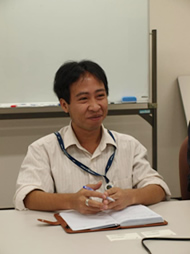
Ha Van Quang:
I have a background in automation control systems and automation control system engineering. Since I joined STI, I've been working on electronics designs and automation system analysis. Therefore, I am really interested in analysis, especially that of attitude determination control systems. So, I joined the STAR program and was put in charge of the study on attitude determination and control system analysis for the micro satellite.
APRSAF Secretariat:
Is this field closely related to software?
Ha Van Quang:
No, not much of software. It is more related to theory. Our job is to design controllers for engineering systems. Therefore, electronics is a tool for implementing the controller on the real system.
When and how did you join the STAR program?
Ha Van Quang:
We joined the team here in early May this year, and we will be staying here for 6 months. So, we will leave Japan in early November.
APRSAF Secretariat:
Before coming to Japan, you actually joined the STAR program. Had you ever heard of the STAR program or APRSAF in Vietnam before coming to Japan?
Hoang The Huynh:
Yes. I learned about this program after joining STI, and one year later, I joined it here in Japan.
Ha Van Quang:
Yes, back in STI, I heard about APRSAF and the STAR program many times. Then, I was selected to participate in this project. I think it is a good chance to improve relationships with other space organizations in the region. Vietnam is a newcomer to satellite technology, and having a good relationship with JAXA or other organizations will be very helpful for us.
APRSAF Secretariat:
How were you chosen or selected to be a member of the STAR program? Did you yourself hope to be a member of the STAR program or did someone recommend that you come to Japan?
Ha Van Quang:
Yes, my boss recommended me for selection to the STAR program. Normally, almost all people—students in our institute—do not really have experience in satellite technology, so the selection criteria for choosing a person to be dispatched to the STAR program were how interested they are in satellite technology and how they want to contribute to the development of our institute, so I had demonstrated my interest and motivation. My boss believed that we could get good results from the STAR program to contribute to our projects back in Vietnam, so we were chosen to be the people who join the STAR program.
APRSAF Secretariat:
How did you feel when your boss said that you had to go to Japan to study about the satellites?
Ha Van Quang:
It was a big, nice surprise, because I really hoped to have an opportunity to study and maybe to do some research in a developed country like Japan, and I know that Japan is very developed in the field of satellite technologies. It was a very good opportunity for me. I was really happy.
APRSAF Secretariat:
And how about you, Hoang, how did you become a member of the STAR program? Did you yourself hope to be a member of the STAR program or did someone recommend you to the program?
Hoang The Huynh:
I also got good results during the time I was working in STI, and I was chosen to join the STAR program. I hope to get more experience and knowledge to help my institute to develop a satellite in the future.
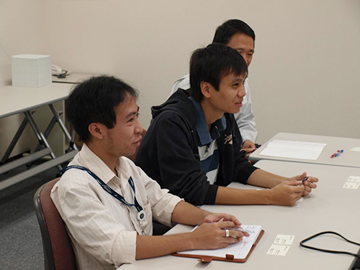
What do you think about international cooperation like the STAR program? Are you happy with the participation?
Ha Van Quang:
I would say yes. I love the work environment in this project. We can meet many people from JAXA, Korea, Malaysia, Indonesia, and so on. All of them have different points of view and different interests in satellite technologies, and so, I can learn a lot from them. And I think it will be really very helpful for us when we return to Vietnam.
Hoang The Huynh:
Like Mr. Quang, I also get more experience, learn more about the curriculum from other Asian countries. Lastly, it is very good for me and for my organization in Vietnam.
How do you plan to use these technologies that you have learned here after returning to Vietnam?
Hoang The Huynh:
In Vietnam, space technology is a new technology. Vietnam has not so much experience in research and development and research of space technology, and I hope I can get more experience from the STAR program. And, when I return to my country, I can help my organization to design and manufacture small satellites by ourselves.
Ha Van Quang:
When I came here, I hoped that we could learn something about electronic design or programming design. That was our first thought about joining this program, but afterwards, Tsuji-san and Sato-san (STAR program organizers, JAXA) have given us many opportunities to study about the process for developing a satellite, and I realized that it is more important for Vietnamese engineers than the program on electronic designs. And so, with our experience gathered here, I hope that I can use this for developing our satellite in Vietnam; I was just one of the many people who came to Japan to study about it, and I hope that together with others, we will develop our own satellite in the near future.
APRSAF Secretariat:
I guess studying technology is obviously very important, but, as you said, learning the process is extremely important. By the way, I think there are some difficulties in cooperating with foreigners, especially in the STAR program, as the cooperation is multilateral rather than bilateral. Have you found any difficulties in this regard?
Hoang The Huynh:
I think my main difficulty is experience because when I joined STI, my major was mechatronics, not space technology. And really, I have participated in just one project on space technology, i.e., a pico satellite, which is a very small satellite. When I joined the STAR program we make "micro STAR satellite" which is also a micro satellite developed by the STAR program. I think it is difficult for me to learn how to make small satellites, and another difficulty is how to cooperate and how to work together with all the members and staff because each person is from a different organization.
Ha Van Quang:
Yes, there are many difficulties in STAR programs. First, expectations of each organization are different. They want to study different aspects of the satellite technologies. So, to cooperate, this would be very difficult and also challenging for Tsuji-san and for each of us. Second, there is a language barrier. Sometimes, Tsuji-san and Sato-san discuss technical details in Japanese, so I have no idea what they are talking about. But, Tsuji-san always tries to help us understand by explaining in English. That is one solution for us. Cooperation with people from other countries with different languages is challenging, but it is also an opportunity for each member, for example, to improve communication skills.
APRSAF Secretariat:
How about your Japanese? Are you studying Japanese?
Ha Van Quang:
Before I lived here, because I knew that I would be coming to Japan to work for 6 months, I took some time to learn Japanese, but this is not enough for me to understand people's speech and may be not be enough for me to live in Japan; but, it turned out that it's not essential to speak Japanese here to buy something or to travel…so, I survived.
APRSAF Secretariat:
I see. Do you two live in the lodge on the campus?
Hoang The Huynh:
I was living in the lodge on the campus for about 2 months. Then, we moved out.
Ha Van Quang:
We are living in an apartment now. I think living in different places during the 6 months is also interesting.
Hoang The Huynh:
The apartment is about a 10 or 15 min walk from here, and it is next to a supermarket.
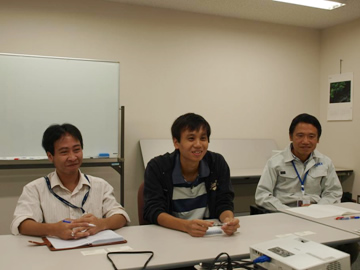
How do you spend your spare time in Japan?
Hoang The Huynh:
I have many friends in Japan who are from Vietnam and are here to study for their master's degree and to work. Over the weekend, I meet them somewhere in Japan, for example, Tokyo or some other area, to talk and to have small parties. It's very good, indeed.
APRSAF Secretariat:
Do you have many things to do during weekends and after work?
Hoang The Huynh:
I really enjoy festivals in Japan. There are so many of them, such as fireworks and carnivals.
APRSAF Secretariat:
How about you, Mr. Quang?
Ha Van Quang:
Yes. I remember a Japanese engineer telling me that when we visit a new country, you study not only their technology but also their culture. So, on holidays besides visiting my friends, I go to cultural places in Japan like Asakusa and Kamakura (very famous historic spots not far from Sagamihara), especially Kamakura. I love visiting the cultural places because they demonstrate not only the current standard of this country but also the history of this country. It is very interesting here over weekends.
To get back to the previous topic, after finishing the STAR program and going back to Vietnam, do you have any preference or hopes for what you want to do in Vietnam?
Hoang The Huynh:
When I return to my country, I hope that I can continue our projects, for example, the pico project, and maybe STAR; we can work together over the Internet or via teleconference.
Mr. Tsuji:
We can communicate with our members in Vietnam. A video conference system is very convenient.
Ha Van Quang:
Besides our projects in Vietnam, I also hope that we will continue to be involved in the STAR program because next year, two people from Vietnam will join the STAR program, and Mr. Huynh and I are the people who will help to select these two participants. After this program, we will have vast opportunities to follow the project from the beginning to the end, and this will be very helpful. Moreover, we as engineers will join other projects like the Pico-Dragon satellite.
APRSAF Secretariat:
After going back to Vietnam, will both of you continue to be involved in the STAR program?
Hoang The Huynh:
Yes.
Mr. Tsuji:
VAST/STI is planning to dispatch engineers to the STAR program in 3 years.
How do you use the knowledge gained from the STAR program to develop Vietnamese indigenous satellites?
APRSAF Secretariat:
I heard that Vietnam has satellites, but they were manufactured by European organizations and companies, like Astrium, I think you want to make various kinds of satellites by yourself.
Ha Van Quang:
Yes.
APRSAF Secretariat:
What are your views on this? I believe both of you will participate in your own satellite project.
Ha Van Quang:
Yes, to buy the satellites from other countries is the current solution to the need for satellites, but our government's strategy is to develop satellites by ourselves. Therefore, establishing an institute of space technology, starting several space projects like pico satellite and joining the STAR program, and sending researchers to other countries like the US or Japan is our way of developing the human resources for satellite technologies. So, I hope that by using this strategy, we will soon achieve results and develop our own satellites.